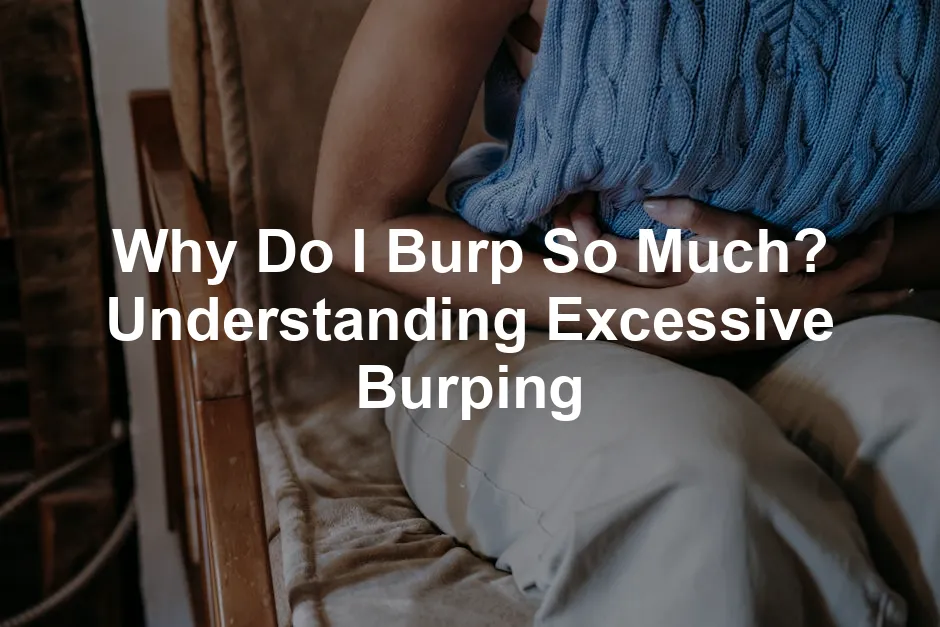
Why Do I Burp So Much? Understanding Excessive Burping
Introduction
Burping, or belching, is a natural part of digestion. It helps release excess gas from your stomach. However, when burping becomes excessive, it can raise concerns about your health. Understanding why this happens is crucial. Knowing the causes can lead to effective solutions for managing excessive burping.
Summary and Overview
Burping is the body’s way of expelling trapped air or gases. This occurs when air is swallowed during eating or drinking. Excessive burping is typically defined as more than 30 times a day. It can be bothersome and might indicate an underlying issue. Common causes range from dietary habits, such as consuming carbonated drinks, to medical conditions like GERD or IBS. It’s essential to be aware of these factors. In this article, we’ll discuss various causes and possible solutions for excessive burping.
Causes of Excessive Burping
Dietary Factors
Certain foods and drinks can significantly contribute to excessive burping. Carbonated beverages are a common culprit. They introduce gas into your stomach, leading to more frequent burps. Additionally, some gas-producing foods, such as beans, broccoli, and cabbage, can exacerbate the problem. Eating too quickly can also worsen burping. When you eat fast, you swallow more air, increasing gas buildup.
Statistics show that the average person burps about 20 to 30 times daily. However, those who consume carbonated drinks or gas-producing foods often burp more frequently. Keeping a food diary can help identify which items trigger excessive burping. By noting what you eat and drink, you can better understand your dietary habits and their impact on your digestive health.

To make tracking easier, consider using a Food Diary Journal. This handy tool can help you identify patterns in your diet that lead to excessive burping, allowing you to make informed changes.
Aerophagia (Swallowing Air)
Aerophagia refers to the act of swallowing air. This can happen in many everyday situations. Common activities like chewing gum, eating quickly, or talking while eating often lead to excess air intake. Furthermore, nervous habits can play a role. People with anxiety might swallow more air, increasing the likelihood of burping.
Studies suggest that aerophagia is quite common. It particularly affects individuals with anxiety disorders. Research indicates that a significant number of people report experiencing this condition. In fact, it’s estimated that a noticeable percentage of the population encounters aerophagia at some point.
To manage aerophagia, consider some effective techniques. Eating slowly can significantly reduce air swallowing. Additionally, avoiding chewing gum and hard candies helps. If you must chew gum, opt for sugar-free options to minimize any negative effects on your dental health.
Gastroesophageal Reflux Disease (GERD)
Gastroesophageal Reflux Disease, commonly known as GERD, is a chronic condition. It occurs when stomach acid frequently flows back into the esophagus. This acid reflux can lead to various symptoms, including excessive burping. Many individuals with GERD report frequent belching as a prominent symptom.
Symptoms of GERD often include heartburn, chest pain, and difficulty swallowing. The mechanism behind burping in GERD patients involves the relaxation of the lower esophageal sphincter. This relaxation allows both air and acid to escape back into the esophagus, causing discomfort and burping.

Research shows that a significant percentage of GERD patients experience excessive burping. This indicates a strong connection between the two. If you suspect you have GERD, it’s wise to consult a healthcare provider for proper evaluation and treatment options.
Irritable Bowel Syndrome (IBS)
Irritable Bowel Syndrome (IBS) is a common gastrointestinal disorder. It affects the large intestine and can lead to various digestive symptoms. Excessive burping is one such symptom experienced by many individuals with IBS.
Common symptoms of IBS include abdominal pain, bloating, and changes in bowel habits. Many IBS sufferers note that certain foods worsen their symptoms. Dietary triggers can vary but often include dairy, gluten, and high-fiber foods.
Statistics suggest that IBS affects a notable portion of the population, with many individuals reporting excessive burping. If you notice a pattern with your symptoms, consider monitoring your diet. Keeping a symptom diary may help identify potential triggers and aid in discussions with your healthcare provider for better management. You might also benefit from a Dietary Supplement like Digestive Enzymes to help support your digestive health.

Helicobacter Pylori Infection
Helicobacter pylori, or H. pylori, is a common stomach bacterium. It plays a significant role in digestive health. Many people carry this bacterium without any symptoms. However, for some, it can lead to issues like excessive burping and discomfort.
Symptoms of an H. pylori infection can include abdominal pain, bloating, and nausea. You might also experience loss of appetite and unexplained weight loss. These symptoms can be bothersome and impact your daily life.
Research shows a strong connection between H. pylori and excessive burping. When this bacterium infects the stomach, it can result in increased gas production. This excess gas often leads to more frequent belching. In fact, studies indicate that over 50% of the global population is affected by H. pylori, highlighting its prevalence.

If you notice symptoms associated with H. pylori, it’s wise to consider getting tested. A simple breath, stool, or biopsy test can confirm the infection. Early detection can lead to effective treatment and relief from excessive burping. You may also want to explore herbal remedies like fennel seeds to soothe your digestive system.
Other Medical Conditions
Excessive burping can also arise from various medical conditions. It’s essential to recognize these underlying issues for proper management.
Gastritis is one such condition, characterized by inflammation of the stomach lining. Symptoms may include burping, nausea, and abdominal pain. It’s often caused by infections, excessive alcohol use, or long-term use of NSAIDs.
Gastroparesis is another condition where the stomach empties slowly. This can lead to bloating, nausea, and frequent burping. It affects many individuals, particularly those with diabetes.
Small Intestinal Bacterial Overgrowth (SIBO) occurs when there’s an abnormal increase in bacteria in the small intestine. This condition can cause excessive gas production and result in frequent belching. SIBO is estimated to affect around 6-15% of the population, making it a common issue.

If you experience persistent excessive burping, it’s best to consult a doctor. They can help identify any underlying conditions and recommend appropriate treatment options. It could be beneficial to have a First Aid Kit handy just in case you need to address any sudden ailments!
How to Manage and Reduce Burping
Lifestyle Changes
Making practical lifestyle changes can significantly reduce excessive burping. Start by eating slowly and mindfully. This simple shift can help minimize air swallowing during meals.
Limiting carbonated drinks is another effective strategy. These beverages introduce extra gas into your stomach, leading to more burps. Consider avoiding gas-producing foods like beans, broccoli, and onions. Instead, why not try a flavored sparkling water as a refreshing alternative?

Chewing gum and sucking on hard candies can also contribute to excess air ingestion. Reducing these habits can alleviate burping symptoms.
Statistics indicate that people who implement these lifestyle changes often see a significant reduction in burping frequency. To find what works best for you, consider making one change at a time. By being mindful of your habits, you can improve your digestive comfort and overall well-being.
Medical Treatments
When excessive burping becomes a concern, it’s important to know when to seek medical help. If burping starts affecting your daily life, consider talking to a healthcare provider. They can help determine if there’s an underlying condition that needs treatment.
For mild cases, over-the-counter (OTC) remedies can provide relief. Antacids are commonly used to neutralize stomach acid. They can help reduce burping associated with acid reflux. Some studies show that these medications effectively decrease symptoms in those with GERD. A popular choice is Tums, which can be a lifesaver when heartburn strikes!

If OTC options don’t work, prescription medications may be necessary. These can target specific conditions like IBS or gastritis. For instance, medications that help regulate digestion can reduce excessive gas buildup. Research suggests that treating underlying gastrointestinal issues leads to a significant reduction in symptoms.
If you find yourself frequently burping, especially if it’s accompanied by pain or discomfort, it’s time to consult a healthcare professional. They can recommend the best course of action tailored to your needs.
Behavioral Therapies
Behavioral therapies can be helpful for managing excessive burping, especially when linked to habits like aerophagia. Cognitive Behavioral Therapy (CBT) is one approach that has shown promise. CBT helps individuals identify triggers and develop coping strategies.
Techniques to control aerophagia are also beneficial. For instance, learning to eat slowly can minimize swallowing air. Mindful eating encourages paying attention to each bite, reducing air intake. You could also consider using a meditation cushion to create a calming eating environment.

Research indicates that CBT can effectively manage gastrointestinal symptoms, including excessive burping. Patients often report fewer episodes after participating in therapy. If burping is tied to anxiety, addressing these feelings could further help. Understanding the importance of coping strategies can be essential for those experiencing anxiety-related symptoms. why are coping strategies essential for handling anxiety in daily life
Coping strategies are vital for managing anxiety, which can lead to issues like aerophagia and excessive burping. why are coping strategies essential for handling anxiety in daily life
If you’re interested in exploring behavioral therapies, seek out a therapist who specializes in gastrointestinal issues. By addressing both mental and physical aspects, you can gain better control over your symptoms.
Conclusion
In summary, excessive burping can arise from various factors, including dietary habits and medical conditions. Recognizing when burping is excessive is key. It’s important to address this issue proactively to maintain your digestive health. Consider both medical treatments and behavioral therapies as potential solutions. Don’t hesitate to consult a healthcare professional for personalized advice. Taking these steps can lead to a more comfortable and healthier lifestyle. And if you want to enhance your kitchen experience, consider investing in a non-stick cookware set for easier meal prep!
FAQs
Is burping normal?
Yes, burping is a natural process. However, excessive burping may indicate a problem. Most people burp 20 to 30 times a day. If you find yourself burping much more often, it could be time to investigate further. Understanding what’s normal helps you identify when something might be off.
What should I do if I burp excessively?
Consider making lifestyle changes first. Eating slowly and reducing carbonated drinks can help. If these steps don’t work, it’s wise to consult a healthcare provider. Persistent symptoms may signal an underlying condition that needs attention. Don’t hesitate to seek help if your burping becomes bothersome.
Can anxiety cause excessive burping?
Yes, anxiety can lead to a condition called aerophagia. This involves swallowing air, which increases burping. When you’re anxious, you may gulp air without realizing it. Managing anxiety through relaxation techniques can help reduce this symptom. Are stress relief methods part of your daily routine?
How can I reduce burping after meals?
Eating slowly is key. This gives your body time to digest without swallowing too much air. Avoid carbonated drinks and limit gas-producing foods like beans and broccoli. Mindful eating can make a big difference. Have you tried keeping a food diary to track your triggers?
When should I see a doctor for burping?
If burping is severe or accompanied by other symptoms, it’s time to consult a doctor. Symptoms like pain, vomiting, or weight loss warrant immediate attention. Don’t ignore these signs, as they could indicate something more serious. Keeping an open line of communication with your healthcare provider is essential.
Is excessive burping a sign of cancer?
While excessive burping alone isn’t a sign of cancer, it can relate to gastrointestinal issues that require further investigation. Conditions like H. pylori infection can increase cancer risk over time. If you’re concerned, discussing your symptoms with a doctor is crucial. Have you had any recent changes in your health?
Please let us know what you think about our content by leaving a comment down below!
Thank you for reading till here 🙂
All images from Pexels




